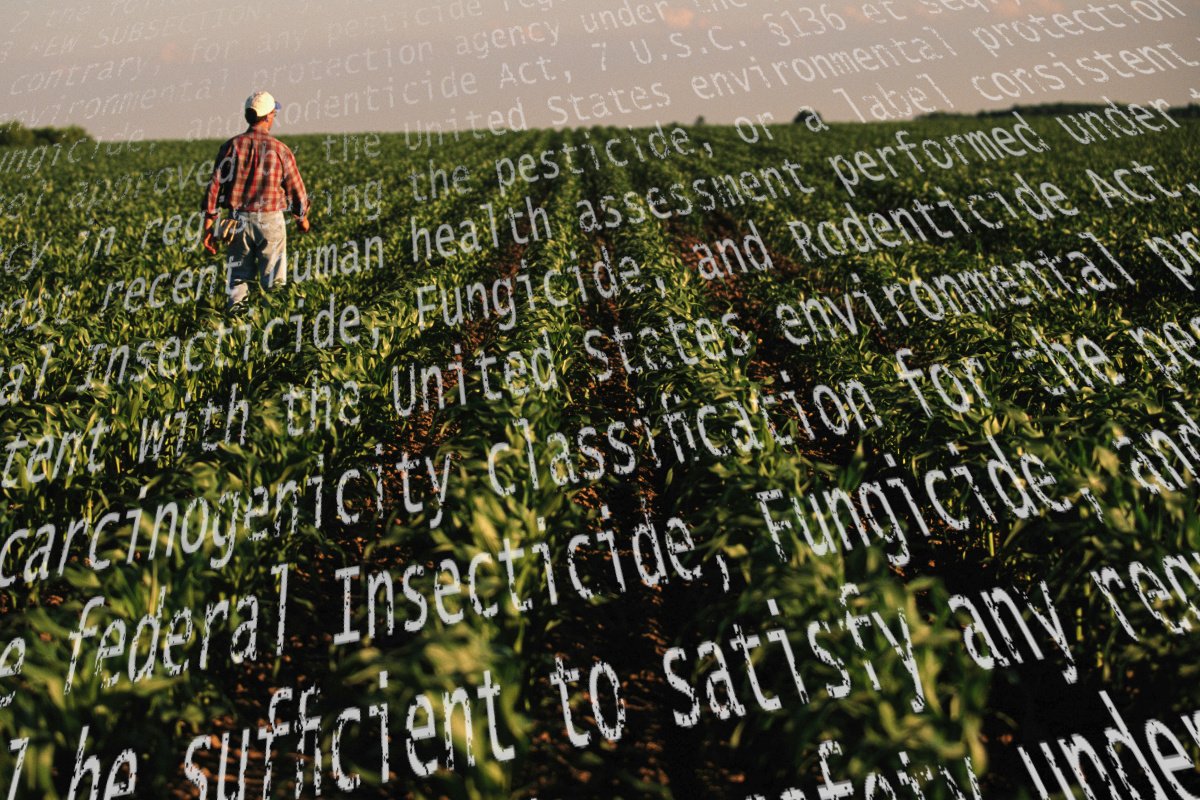As the agrichemical giant lays groundwork to fend off Roundup litigation, its use of a playbook for building influence in farm state legislatures has the potential to benefit pesticide companies nationwide.

As the agrichemical giant lays groundwork to fend off Roundup litigation, its use of a playbook for building influence in farm state legislatures has the potential to benefit pesticide companies nationwide.
March 27, 2024

April 1, 2024 update: Two days after Civil Eats reported on this matter, a group of senators signed a letter addressed to Senate leaders opposing “all efforts to preempt state and local authority to regulate pesticides.”
On TikTok, Iowa State Representative Megan Srinivas is angry.
“To me,” she says, pointing at herself with both hands, her eyebrows raised, “Iowa’s farmers matter more than corporate interests.”
Srinivas, a Democrat, posted the video on February 7 to draw attention to a bill that was just starting to make its way through the statehouse. If passed, the legislation could prevent individuals who use pesticides from suing manufacturers based on the argument that the manufacturer should have warned them the products could cause cancer or another illness.
Srinivas is a physician, and one specific concern added to her outrage. Less than a year earlier, the Iowa Cancer Registry released data showing Iowa now has the second highest cancer rate in the country, after Kentucky, and is the only state where rates significantly increased between 2015 and 2019. For the first time, researchers at the Iowa Cancer Consortium have a plan to evaluate whether the incredible volume of weed- and bug-killers used in the state is a contributing factor (although an annual report released at the end of February focused more on high rates of binge drinking).
However, while other states have seen a flurry of more than 100,000 lawsuits brought by individuals claiming Roundup—the most widely used commercial product that contains the weedkiller glyphosate—had caused their cancers, Iowa stands apart. Especially in agriculture, most people trust the safety of pesticides, locals say, and Roundup is the most common and coveted.
“There’s still that culture of, ‘It’s only Roundup,’” said Rob Faux, an Iowa farmer and the communications manager for the Pesticide Action Network North America (PANNA). “They see it as low-risk . . . and there is a latent fear that glyphosate will be taken away. The standard response we get from legislators is, ‘Well, you know, those are frivolous lawsuits and glyphosate’s safe.’”
That’s a sentiment that Bayer Crop Science can use to its advantage.
Bayer purchased Monsanto, the maker of Roundup, in 2018. Ever since, the world’s now second-largest farm chemical company has been steadily executing a five-point plan to fight back against the aforementioned lawsuits.
Now, insiders say it’s using the outsized sway it holds among the public and elected officials in agricultural states to quietly execute a new strategy: Pass laws, state by state, that take away farmers’ and other individuals’ ability to sue if they get sick.
“I would argue that this is the sixth prong of their plan,” said Jonathan Oppenheimer, the government relations director at the Idaho Conservation League (ICL), where he’s been working with a coalition of groups to fight an identical bill that is also being pushed by Bayer. “It’s written in invisible ink.”
For example, when the Iowa bill was first put forward, “the only lobbyists who were paying attention were Bayer’s lobbyists,” Faux said, “so you can kind of put two and two together.”
Starting in the Iowa House subcommittee hearing that inspired Srinivas to take action, Bayer lobbyists Brad Epperly and Craig Mischo presented the bill to the subcommittee. There, Srinivas said their language on the kinds of studies that exist linking Roundup to potential cancer risk was misleading. “That subcommittee [meeting] had so much misinformation that people just believed,” she told Civil Eats. “To still have a bill [move forward] was very concerning.”
Insiders say Bayer is using the outsized sway it holds among the public and elected officials in agricultural states to quietly execute a new strategy: Pass laws, state by state, that take away farmers’ and other individuals’ ability to sue if they get sick.
In an email, Bayer Crop Science representative Brian Leake said the company maintains that “the overwhelming weight of science as well as the assessments of the EPA and leading health regulators and scientists worldwide” support the company’s position that the product is safe and non-carcinogenic.
While the U.S. Environmental Protection Agency (EPA) maintains that glyphosate is unlikely to cause cancer in humans, the International Agency for Research on Cancer classifies it as a “probable carcinogen,” pointing to many animal studies and epidemiological evidence that link it especially to non-Hodgkin’s lymphoma. In court, judges and juries have repeatedly found the body of research presented to be convincing.
They have also been presented with reams of evidence documenting how Monsanto worked to influence scientific studies and discredit any research that found significant risks for years. “There is strong evidence . . . that Monsanto does not particularly care whether its product is in fact giving people cancer, focusing instead on manipulating public opinion and undermining anyone who raises genuine and legitimate concern about the issue,” U.S. District Court Judge Vince Chhabria said during one 2019 trial.
Now, in addition to Iowa and Idaho, similar bills have been introduced in Missouri and Florida. At the same time, the pesticide industry’s trade association CropLife America is working hard to pass a federal law that would bar states from passing their own laws that restrict pesticide use based on risks.
The multi-pronged strategy is just one example of how multi-billion-dollar global companies use their influence to change laws and keep pesticides on the market—and the stakes in this case are high.
The bills don’t name specific chemicals, the companies that make them, or individual illnesses. If passed, then, they could seriously curtail citizens’ ability to seek compensation for any health harms caused by any pesticide. Last year, for example, farmers in multiple states brought lawsuits against Syngenta, the ChemChina-owned company that makes the herbicide paraquat. Paraquat is banned in dozens of countries based on its toxicity and has been linked to Parkinson’s disease.
“We have Iowa farmers who have brought lawsuits recently for Parkinson’s and paraquat,” Faux said. “To emphasize that it’s all pesticides [that are included] would be a very quick way for the bill to lose any support. That’s why the messaging is glyphosate.”
In addition to Iowa and Idaho, similar bills have been introduced in Missouri and Florida. At the same time, the pesticide industry’s trade association CropLife America is working hard to pass a federal law that would bar states from passing their own laws that restrict pesticide use based on risks.
Bayer’s Leake declined a request for an interview and sent a statement that reads, in part, “We support state legislation alongside dozens of other agricultural organizations because the future of American farming depends on reliable science-based regulation of important crop protection products that the EPA has determined safe for use.”
A Syngenta representative declined a request for an interview and the opportunity to provide comments. On its website, the company maintains that “scientific evidence does not support a causal link between paraquat and Parkinson’s disease” and that the herbicide “is safe for its intended and labelled use.” In Iowa, Syngenta backed an early version of the bill, but its lobbyists have since registered against later versions.
On February 6, the day before Srinivas posted her video in Iowa, Idaho Senator Mark Harris, a Republican, began a presentation at a Senate committee meeting. His order of business was to present a bill that matched the Iowa legislation nearly word for word.
Harris represents Soda Springs, where Bayer operates a 540-acre processing plant to manufacture glyphosate. Rather than make his own case for giving pesticide companies’ immunity from claims of health harms, he turned his time over to James Curry, Bayer’s deputy director of state and local government affairs.
Curry led with Bayer’s history of mining phosphorus in Idaho to make glyphosate, which it had been doing since 1952. He argued that when used according to the label requirements, glyphosate was safe. Bayer’s legal costs were creating uncertainties, and according to the minutes, “he stated the industry needed help from the legislature to ensure its ability to mine.”
It was only a month into 2024, but the company had already reported spending more than $6,000 lobbying for the single bill in Idaho, compared to just $800 spent on any lobbying in the state the entire year prior.
Both nationally and in individual farm states, Bayer and other pesticide companies join and support overlapping associations and trade groups that involve industry peers and yield influence behind the scenes. In Idaho, for example, the Food Producers of Idaho have been involved in lobbying for the bill. Bayer is a voting member of the Food Producers of Idaho and one of the organization’s “platinum” sponsors for 2024. Other members include Idaho’s sugar beet growers, who have almost universally adopted planting beets genetically modified to be resistant to glyphosate.
Individuals representing the industry testified in support of the bill at the hearing. In emails obtained by U.S. Right to Know, Monsanto employees (before the Bayer purchase) listed “inoculate key grower associations” as one of a few important steps in a strategy to keep Roundup on the market after IARC’s carcinogen designation.
“The more layers of the onion you peel back, the more you realize how the system is just tilted toward industry,” said ICL’s Oppenheimer, who attended the Idaho hearing.
Back in Iowa, groups including the Agribusiness Association of Iowa and the Iowa Biotechnology Association have lobbied for the immunity bill. The Agribusiness Association of Iowa counts Bayer and all of the other largest pesticide manufacturers among its members and lists a Bayer employee as an “at-large director.” Bayer is also a member of the Iowa Biotechnology Association and holds a board seat.
Last year, the Agribusiness Association of Iowa hosted a “2023 kickoff fundraising reception” for Secretary of Agriculture Mike Naig and two members of the Iowa legislature, Representative Mike Sexton and Senator Dawn Driscoll, both Republicans. Sexton has received campaign donations from both Bayer and Syngenta during campaigns; Driscoll has received donations from Syngenta and the Agribusiness Association of Iowa’s PAC. Outside of the Senate, Driscoll works for an agribusiness consulting company that has worked with Syngenta as a client.
As chairs of the House and Senate agriculture committees, respectively, Sexton and Driscoll have helped move the bill forward in each chamber.
Neither Sexton nor Driscoll responded to requests for comment.
Secretary Naig’s communications director said the Secretary has not been involved with the pesticide immunity bills at all. But Austin Frerick, an Iowa-based agriculture policy expert and author of Barons, pointed to Naig’s resume as an example of how industry ties are commonplace and deeply rooted in Iowa’s state government.
Starting in 2000, Naig worked at CropLife America, the pesticide industry trade association, the Agribusiness Association of Iowa, and then the Iowa Biotechnology Association. From there, he went to work on government lobbying at Monsanto. In 2013, he was hired by the Iowa Department of Agriculture and Land Stewardship. When the top position became available in 2018, Governor Kim Reynolds, a Republican, appointed him.
That appointment “told me where real power is in the state,” Frerick said. “You’ve got to view Iowa as an extraction economy. The whole political class is in on it.”
When Naig had to run for re-election later, Monsanto handed him $10,000, his largest 2018 donation. In elections since, Bayer has donated thousands in most cycles, alongside the other biggest pesticide manufacturers, Syngenta and Corteva Agriscience.
Still, the elected officials and coalition of public health and environmental advocacy organizations pushing back on the bills are succeeding in their efforts. The mounting lawsuits around paraquat and its foreign ownership are their weapon of choice.
In Srinivas’ TikTok video, her language is pointed, as she calls it out for being “Chinese-government owned.”
Her point? Since Syngenta is owned by ChemChina and makes paraquat, if any of the pesticide immunity bills pass, it would make it harder for American citizens to hold a Chinese company accountable for potential harms.
Plus, unlike Roundup and other products made with glyphosate, China, the European Union, and the United Kingdom consider paraquat dangerous enough to have banned it in agriculture. (A single sip can kill a human.) Despite decades of legal battles and dozens of new studies that link long-term exposure to Parkinson’s disease, the EPA recently reapproved its safety when used with proper precautions.
Whatever the pesticide, Bayer’s argument is that the warnings and precautions the EPA outlines on its labels are adequate. In his email, Bayer’s Leake argued that the bills would not prevent anyone from suing a pesticide manufacturer but rather would ensure the EPA’s labels are sufficient to satisfy health and safety warnings.
But those warning labels focus on acute risks, such as what will happen if you drink the chemical or breathe in the spray. And experts say that the agency’s process is not set up to assess long-term risks of lower-dose exposure.
“It will not warn you about frequent low-dose exposure leading to Parkinson’s,” said PANNA’s Faux, so if more studies are published in the coming years that offer further proof of the link, bills like these would prevent individuals from seeking recourse. Historically, there are countless examples where the risks of pesticides approved as safe came to light only years after they were in use; DDT and chlorpyrifos are good examples. “Iowa likes to say we value our farmers, that’s what we lean into,” he said. “Well, there are some farmers, some family farmers, who stood up and said, ‘We’re dealing with illness that we feel might have been caused by pesticides.’ You don’t abandon them.”
While the state-level bills agrichemical companies are working to push through would make it harder for individuals to sue companies when they believe products have caused their illnesses, the companies are simultaneously working on federal legislation that would weaken states’ ability to warn residents of risks.
Last year, representatives Dusty Johnson (R-South Dakota) and Jim Costa (D-California) introduced the Agricultural Labeling Uniformity Act, which would prohibit states from putting their own warning labels on pesticides in addition to those required by the EPA.
For example, in California, Proposition 65 requires companies to put a warning label on all products that contain ingredients classified by IARC as “probable human carcinogens.” Since glyphosate fits the bill, Roundup and other glyphosate-based herbicides would have to carry the label (although a court ruling changed that in 2020). If the Agricultural Labeling Uniformity Act passed, it would make it illegal for California to put that label on those products.
Now, CropLife is using its political influence in D.C. to ramp up its campaign to get the language from the bill included in the upcoming farm bill. As the pesticide manufacturers’ membership association, CropLife pools funds from Bayer and other pesticide companies and donates to candidates through a PAC while also courting lawmakers.
For example, at its annual gathering last week, it hosted two receptions where company representatives could mingle with either Senator Jon Tester (D-Montana) or Representative Adrian Smith (R-Nebraska) in exchange for a campaign contribution. The organization also lobbies on Capitol Hill and works on messaging campaigns.
In February, the group ran ads in Politico’s Morning Ag newsletter, influential among policymakers and other key players in D.C, which framed the bill as necessary to protect American farmers. “U.S. farmers’ access to pesticides, which are critical for growing crops in an affordable and sustainable way, is in jeopardy because of misguided state regulatory efforts. . . . Over 360 agricultural and other groups support the bipartisan Agricultural Labeling Uniformity Act to help the U.S. correct course,” one ad read. To garner public support, the group has been running similar ads on Facebook.
At this point, Faux and Oppenheimer are working with a coalition of groups across state lines, and they’re optimistic that their messages are gaining traction.
In Iowa, after the bill failed to move in the House, it passed in the Senate Agriculture Committee but then stalled there. Then, last week, it was reintroduced in the Senate as an appropriations bill. This time, it included a new clause specifying that it would not apply to “any product made by a People’s Republic of China state-owned enterprise.” While the session is nearing its end, Faux said there is still time for it to move further, since the legislature often goes beyond its posted scheduled.
“We’re sacrificing our future for the present,” said Brian Lenney, a Republican. “And lastly, I don’t think giving lifetime immunity to multi-billion-dollar pharmaceutical companies was on our constituents’ bingo card when they sent us here.”
But even if it fails, the groups are already looking to the next session in 2025. “If it looks like it’s going to go away quietly, we need to be ready for the next [session],” he said, because it could mean that “they decided to modify it based on the lessons learned and come back next year with it.”
In Idaho, the bill has already been modified three times. After the Senate committee narrowly voted it down, a new version of the bill was introduced in the House, with small tweaks meant to get some of the doubting lawmakers on board. However, it was scheduled to be presented in a House committee in early March, when, to everyone’s surprise, lawmakers deleted it from the agenda hours before the meeting started. Then, a slightly modified version was introduced in the Senate last week. Given the limited time remaining in the session, Oppenheimer believes it’s unlikely to pass.
But the bill’s future is still just as unclear as it was in the original Idaho hearing. There, on both sides of the aisle, lawmakers went out of their way to praise the agriculture industry. Some named Bayer specifically. But then, some who presented as supportive went on to say that they were still voting no, often citing family members who suffered through cancer diagnoses and discomfort with the idea that this would preemptively let powerful companies off the hook.
“We’re sacrificing our future for the present,” said Brian Lenney, a Republican. “And lastly, I don’t think giving lifetime immunity to multi-billion-dollar pharmaceutical companies was on our constituents’ bingo card when they sent us here.”

September 4, 2024
By paying top dollar for milk and sourcing within 15 miles of its creamery, Jasper Hill supports an entire community.
September 3, 2024

August 27, 2024

August 26, 2024

Technically speaking, the term "Pesticide" encompasses the subcategories of Insecticides, Fungicides, Herbicides, Nematicides, and Rodenticides.
https://www.epa.gov/minimum-risk-pesticides/what-pesticide